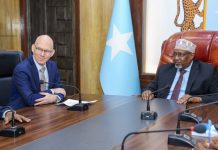MOGADISHU, 30 April 2021 – Vaccines protect us against preventable diseases, including COVID-19. They bring us closer to a healthier world and are permissible to be taken during the holy month of Ramadan — these are the main messages the Federal Ministry of Health and Human Services, World Health Organization (WHO) and United Nations Children’s Fund (UNICEF) in Somalia are sharing this World Immunization Week, running from
24 to 30 April 2021. On this occasion, the Federal Ministry of Health, WHO and UNICEF are renewing their commitments to ensure that every child is counted for vaccination against vaccine-preventable diseases.
This year, World Immunization Week comes at a time when the country is conducting one of its largest, much-needed vaccination campaigns, against COVID-19. Every year, during the last week of April, World Immunization Week is observed to encourage the use of vaccines to protect people of all ages against disease. The theme for this year is ‘vaccines bring us closer’ – to encourage greater global participation around immunization and to demonstrate to communities, politicians and other audiences that vaccines do indeed bring families, communities and countries closer together.
With support from the Federal and State Governments of Somalia, WHO, UNICEF and other agencies have been providing vaccines – while observing COVID-19 protocol since last year– to Somalis of all ages and backgrounds – against preventable diseases such as measles, pertussis, diphtheria, tetanus, hepatitis B, haemophilus influenza type b, cholera, tuberculosis, polio and now against COVID-19.
Since the resumption of mass vaccination campaigns, which had been paused due to the COVID-19 epidemic in 2020, Somali authorities, with support from WHO, UNICEF and other partners, have conducted five targeted campaigns and one nationwide campaign, where approximately three million children were offered vaccines to protect them from polio. In addition, 514,567 (83% of the target) and 450,983 (73% of the target) children aged under one year received pentavalent 1 and pentavalent 3 vaccines respectively. Overall, 433,863 (70% of the target) children aged under one year received their first doses of measles vaccines to protect them against this highly infectious disease.
“We are at a critical time, where we can save humanity from the COVID-19 pandemic, especially as we have tools like vaccines to protect people. In Somalia, we remain concerned that the current uptake of the vaccine is not optimal. The pandemic will not end if it doesn’t end in Somalia and other conflict-affected countries with very weak and fragile health systems,” said Dr Mamunur Malik, WHO Representative for Somalia.
Addressing people’s concerns regarding the uptake of the COVID-19 vaccine during Ramadan, Dr Malik explained, “I want to assure people that two Fatwas have been issued by the Al-Azhar Al-Sharif and the International Islamic Fiqh Academy (IIFA), the co-chairs of the Islamic Advisory Group. The Fatwas offer advice that it is permissible to take COVID-19 vaccinations, as this vaccine goes into the muscles, not bloodstream. We must share information with our loved ones and friends about the benefits of vaccination. In the last decade, at least 10 million deaths have been prevented by vaccines, and more lives have been saved by vaccines in the history of medicine. Vaccines are the most cost-effective health technology ever invested in, during the history of our civilization. We are responsible for our health and that of our children. We should support them in accessing vaccines for their age too. No one is safe until everyone is safe.”
Since March 2020, when the first case of COVID-19 pandemic was confirmed, this had an impact on all health programmes, including routine immunization. An estimated,186,000 children missed their first doses of the measles vaccine in 2020 and around half a million are missing out on polio vaccines, also due to limited access and insecurity.
However, the Government, WHO, UNICEF and partners are working to ensure health facilities and personnel use all precautions possible while delivering services.
“The devastating COVID-19 pandemic has reminded the world how important and effective vaccines are,” said Mohamed Ayoya, UNICEF Somalia Representative. “Vaccines protect us from life-threatening diseases and safeguard our future health. It is critical that we accelerate COVID-19 vaccinations and scale up routine immunization especially for children in hard to reach areas. Reaching and protecting these children is a priority.”
In last quarter of 2021, the Somali Federal Government, WHO and UNICEF and other partners have plans to introduce a second dose of inactivated polio vaccine (IPV) and measles vaccines as part of the routine immunization programme, now being extended to children older than one year of age. This will boost their immunity, particularly in the event they may have missed one dose of measles or polio vaccines when younger.











